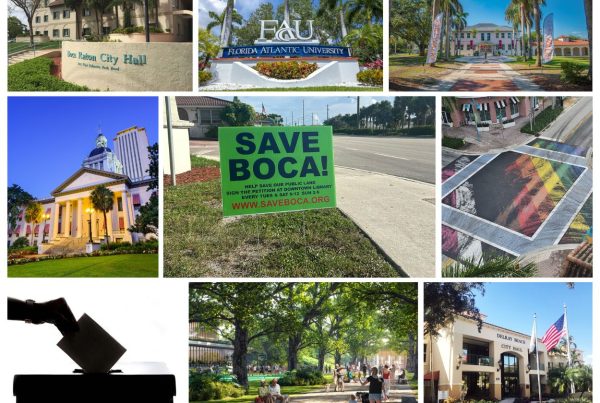New hotel? Not so fast
The Kolter Group had every reason to think that things would go smoothly as Delray Beach reviewed the company’s plans for a second hotel in the city.
After all, Kolter built the stylish Hyatt Place in Pineapple Grove, which city leaders see as a complement to the area. Early reviews have been good for the Hyatt Place in downtown Boca Raton. The company’s new Delray project is on the east side of Federal Highway, two blocks south of downtown. Kolter has assembled four properties for its proposed 150-room hotel.
And on Jan. 25, the project was before the Site Plan Review and Appearance Board with a staff recommendation for approval. What could go wrong?
A lot.
City planner Candi Jefferson presented the project. Jefferson said it complied with all codes. The architectural style—Masonry Modern—is one of seven allowed in the area. It will be a green building. The height will be 54 feet, what the rules allow.
Then Dan Sloan went to the mike. He’s president of the Marina Historic District Homeowners Association. He lives in the condo that is northeast of the site. Sloan said Jefferson had “dropped the ball” by not giving the HOA enough advance notice and the project and the SPRAB meeting. He predicted “massive gridlock.” He said the project could “destroy” traffic-calming measures the HOA hopes the city and/or Edwards Companies will pay for to reduce the traffic impact from Atlantic Crossing.
Sloan also criticized the design. Masonry Modern might be code-compliant, Sloan said, but he wants a look more like Mallory Square or the Seagate Hotel & Spa.
Bradley Miller, the land planner who was representing Kolter, quickly learned that the board members were on Sloan’s side. When Chairman Roger Cope asked for comment, there was a pause. Vice Chairman James Chard then said he saw “another Atlantic Crossing in the making.” Let us assume that Chard is sincere. He’s also running for city commission next month, and there are votes in the marina district.
Chard, though, was not an outlier. Other board members weren’t so forceful, but they didn’t agree with the defense Jefferson offered in response to Sloan’s comments. She said no rule requires neighborhood notification—just that the city post all information on its website. As for the complaints about traffic, “these things happen” when people live near districts zoned for certain uses.
As the discussion proceeded, the sticking point remained the design. One board member used the expression my daughter does when she spots someone making a poor fashion choice: “Just because you can doesn’t mean you should.” Cope summed things up when he said, “We’re just looking for a better piece of architecture.”
Last week, I spoke with city planner Anthea Gianniotes, to whom the city has assigned the Kolter project. She gave a wonderfully coherent analysis of how the proposed hotel reveals the difficulty of achieving city goals that are worthy but sometimes contradictory.
Sloan is upset that the hotel would have only one access point from Federal Highway. Traffic also would go through an alley on the north side of the hotel, and that could be a problem for nearby residents.
As Gianniotes points out, however, Delray Beach also wants to make Federal Highway—northbound, in this part of town—more walkable. That means limiting the number of turn-ins. Hotel guests, Gianniotes said, will want to walk to Atlantic Avenue for dinner.
Though it would not be as long as the project just to the west that includes the Aloft hotel, the Kolter hotel would stretch along Federal Highway. Board members weren’t crazy about that, but Gianniotes notes the obvious: Delray Beach’s four-story height limit. If property owners can’t go up, they will go long, and the rules allow it.
Gianniotes told me that the city was working to “facilitate” meetings between Kolter and the residents, perhaps over the weekend. I’ll update this topic when there are developments.
Prices rising
If nothing else, the hotel project shows how quickly the price of downtown Delray Beach land is rising.
Those properties, which comprise just a bit more than an acre, sold for $685,000 in November 2005, when the owner wanted to build townhomes. Kolter bought the property last year for nearly $3 million four months ago.
Delray Place update
If Kolter wants to find something hopeful after that gobsmacking at SPRAB, the company still is much better shape than the owners of Delray Place.
They wanted to expand their project, at Linton Boulevard and Federal Highway, to the south. Residents of Tropic Isle protested that the expansion would route all traffic onto the narrow street that is the entrance to their neighborhood. SPRAB agreed, and rejected the site plan.
Delray Place appealed, and lost at the commission. So the site plan has been denied. The owners must wait a year to ask again for that plan. Obviously, they instead need to come up with a different plan.
Atlantic Crossing session
Last week, the Delray Beach City Commission spent nearly as much time during the regular meeting as during the special meeting on Atlantic Crossing.
A 90-minute regular meeting in Delray is unusual. So is a 90-minute meeting related to a lawsuit. One can assume that commissioners kept up the venting we heard last month when they rejected the proposed Atlantic Crossing settlement. Edward Companies was ready to accept the terms, but as commissioners peeled back the details, they found it lacking.
Executive sessions are closed to the public, but the city’s lawyers probably heard that the commission wants any settlement linked to Atlantic Crossing’s development agreement. The focus of the rejected settlement was an access road to Federal Highway, but the commission has many other issues. One of the most important is parking, since all of it will underground in an area that floods.
City Attorney Max Lohman said another Atlantic Crossing executive session would happen soon.
Special events update
Here’s an update on Delray Beach’s attempt to focus special events downtown on residents, not visitors.
The city recently hosted its annual fashion week. In praising all the volunteers, Mayor Cary Glickstein made it a point to note that most of the attendees were locals.
Interestingly, last weekend was Garlic Fest’s debut at John Prince Park after being a fixture in Delray. Glickstein and city commissioners cited the event as one that helped the city at one time but had become more of a hassle.
Organizer Nancy Stewart told the South Florida Sun Sentinel that Garlic Fest outgrew Delray Beach “years ago” and so moved to the larger site. That didn’t sound like the Nancy Stewart who tried so hard to stay in Delray Beach despite the new special events policy.
Looking for sand
Boca Raton has a sand hunter.
OK, not really. But Jennifer Bistyga, the city’s coastal program manager, said the city does have a consultant who performs what Bistyga calls a “geotechnical sand search.” The goal is to find places— technically called “borrow areas”—from which Boca Raton can pump sand to renourish the city’s constantly eroding beaches. Bistyga anticipates that the consultant will identify 9 million cubic yards by the end of the year. Assuming the city can get permits, Bistyga said that amount would be enough to last nearly half a century.
Boca Raton’s current work is on the Central Beach. Work was delayed last week because high seas meant the dredge couldn’t get here from Palm Beach. When the work is done, the city will have used its two borrow sites for the project. Thus the need to seek more for the central and northern beaches. For the southern beach, Bistyga said, the city can keep relying on the source that has supplied sand for three decades.
If that long-term source of sand holds up, Boca Raton will be lucky. Coastal cities in Broward and Miami-Dade counties have used up their domestic sources and want to buy sand from foreign countries, the Bahamas being the most obvious.
Federal law, however, doesn’t allow such purchases. So the region’s congressional delegation—in a rare show of bipartisanship—is backing the Sand Acquisition, Nourishment and Development Act—or SAND Act. It would repeal the ban on foreign purchases and, as Rep. Lois Frankel, D-West Palm, puts it, “mitigate potential legal battles over domestic sand sources between northern and southern Florida counties.”
Missed the last City Watch? Don’t worry. Visit our Community/City Watch page and subscribe to the magazine for the best coverage of Boca and Delray.








